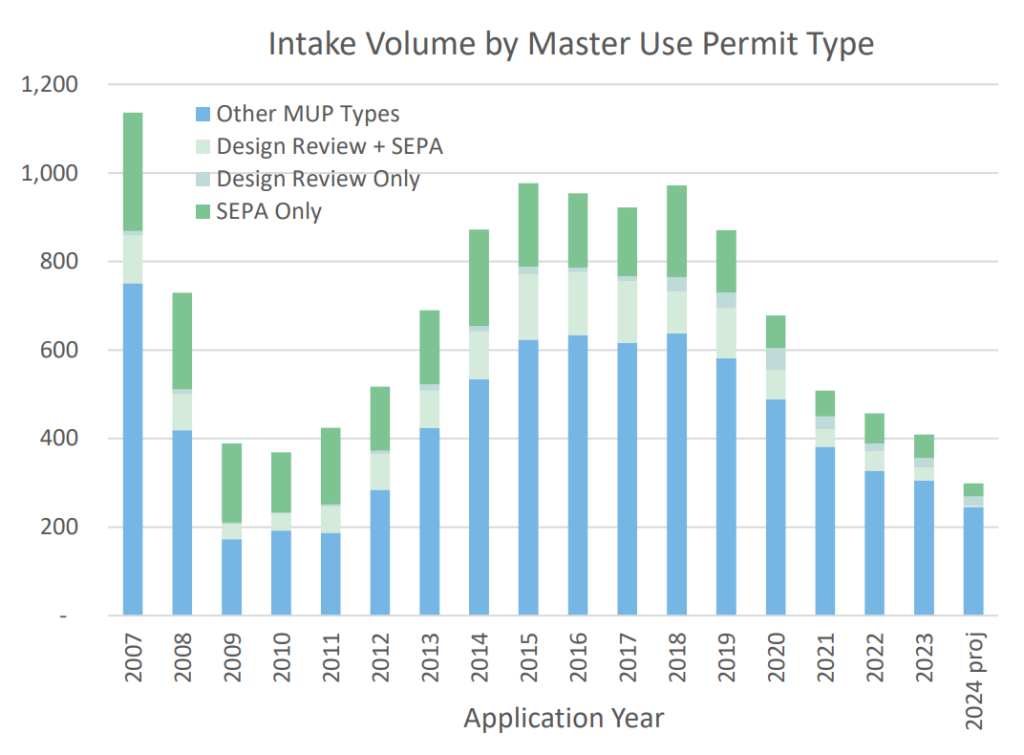
Planned layoffs at the Seattle Department of Construction and Inspections (SDCI) would make the department one of the hardest hit by the staff reductions included in Mayor Bruce Harrell’s 2025-2026 budget proposal. SDCI is responsible for enforcing Seattle’s labyrinthine land use code, renter protections, and new tree protections, but the lion’s share of its funding comes directly from permit fees levied on developers. With applications for building permits hitting a decade low, city officials argue that a staff reduction is unavoidable.
Under the proposal, currently under consideration by the Seattle City Council, nine permanent staff positions would be eliminated, and another 20 positions that had been set to be eliminated at the end of 2025 would be cut a year early. All told, the layoffs would represent a cut of just under 7% of the entire department. Moreover, the cuts would prompt changes in job assignments up and down SDCI’s org chart, and represent a significant shakeup.
SDCI has been touting progress toward a structural overhaul in response to a city auditor’s report that stressed a need to improve “customer focus and consistency” and reduce permit times, but it’s not clear what the implications of these staff cuts will be, both in the short-term and long-term.
The proposed cuts come at a time when the city is ramping up efforts to encourage development activity. Homebuilders have complained that slow, unpredictable permit processes add project costs and encourage them to look elsewhere, and an understaffed SDCI could exacerbate that trend. Employees at SDCI worry that a significant reduction in staff at SDCI could result in long-term hit to the department’s effectiveness.
“Our workers in SDCI do much more than permit review,” Jamie Fackler, an SDCI employee and a union steward for PROTEC17, told The Urbanist. “They provide vital customer service to homeowners, building owners, and builders by being on call to answer questions about complex land use and development questions. If Seattle is concerned about developing more affordable housing quickly, laying off highly-qualified staff that play a vital role in approving permits and reviewing complex projects is not the way to do it.”
Just last month, the City Council approved a three-year downtown design review moratorium on the heels of a bill encouraging more office-to-residential conversions, moves that are all intended to prompt developers to get their projects in the queue. While design review requirements being dropped means fewer onerous meetings for SDCI staff to conduct, those projects will still require staff time.
The current housing starts downturn may not be long-lived. As federal interest rates begin to come down and make some dormant projects feasible, the development industry is expecting a rebound, with permit intake volumes potentially ticking back up again.

Nonetheless, SDCI insists that there won’t be an impact on development projects.
“Permit timelines will not be affected by the staff reductions because fewer projects will require a master use permit, and the retained staff will be sufficient to review the anticipated permit volumes,” SDCI’s Shane Muchow told the Council at a budget briefing late last month.
SDCI Director Nathan Torgelson touted the fact that the department has been given contingent budget authority, which essentially means that unlike other departments, which would have to ask the Council to approve the hiring of additional staff, SDCI can go out and hire people right away if it’s needed.
“With the continent budget authority, when the economy does come back — which it will — we can immediately go into the hiring process, which is a great benefit,” Torgelson said. But he said that only saves around three to six months, with the department able to fill existing positions that become vacant much more quickly.
During the briefing, councilmembers including Tanya Woo and Land Use Committee chair Tammy Morales peppered SDCI staff about the planned layoffs. Morales noted additional land use reforms down the road that could potentially increase master use permit requests, like planned accessory dwelling unit (ADU) reform. And she noted that the council has not yet made any policy decisions about the permanent future of the design review program, which has to be modified to conform with state law by the end of 2025.
Morales also brought up staffing levels at the Code Compliance division, which is not funded by permit fees but rather the City’s General Fund, which is receiving a significant boost in funding thanks to dollars diverted from the JumpStart payroll tax.
“We’ve got something like 9,000 outstanding code compliance issues, so that is […] still a problem,” Morales said. “I’m kind of flummoxed at why we’re cutting positions in code enforcement and compliance.”
Torgelson noted that SDCI is developing a plan to tackle outstanding code compliance issues, but the proposed budget eliminates a vacant position in that group.
But Dan Eder, interim Director of the City Budget office, seemed to get defensive when facing Council’s questions about whether the layoffs at SDCI are in the city’s best interest.
“We fund these staff with permit fees. Permit fees are not there to continue supporting the employment of those staff. So consequences could be worse, and we’d still not have the money to pay for the staff, because the permit fees haven’t been there at a level sufficient to keep those people employed,” Eder said. SDCI’s permit fees, along with street use fees and parks fees (including athletic field rentals and pool usage fees) are all set to see an increase in Harrell’s budget.

While SDCI touts the ability to rehire staff quickly, planning staff are in high demand in a region with substantive land use overhauls happening in jurisdictions of all sizes, thanks to recent changes in state law.
“Training for most positions at SDCI occurs on the job, and it takes many years for reviewers to develop the knowledge to quickly and accurately review plans,” Fackler said. “These cuts will set SDCI back several years by losing important institutional knowledge, which sets the stage for longer wait times in the future.”
Another budget cut victim: the Seattle Planning Commission
The Mayor’s proposed budget also includes a proposed staff cut that could have an oversized impact when it comes to impending discussions around housing and growth planning. The Seattle Planning Commission, a body that is mandated by state law to advise the Mayor and City Council on land use issues, would lose half its policy staff leaving only one full-time employee tasked with providing policy guidance to the Commission. The position to be cut has been filled by John Hoey since 2016.
Operating as part of the Seattle Office of Planning and Community Development (OPCD), the Planning Commission has been highly involved in analyzing the early drafts of the city’s Comprehensive Plan, issuing a full critique of the ways that the plan reinforces past policy mistakes and providing recommendations on proposed fixes. With an updated draft of the plan expected later this month, the staff cut comes at one of the most critical times in Seattle’s growth planning cycle as the City Council prepares to dig into the plan early next year. In addition to land use planning, the planning commission is also heavily involved in transportation planning, issuing recommendations for refinements to the Seattle Transportation Plan last year.
“We commissioners absolutely depend on staff to help us make sense of some so the densest, dryest documentation a city could produce and keeping John is a great investment in Seattle’s future,” planning commissioner Matt Hutchins tweeted on X in reply to news of the impending cut.
In the coming weeks, the Seattle City Council will have to decide how to modify the budget that has been recommended to them. Policy priorities for SDCI and OPCD will be competing against those at other departments, as they grapple with whether to endorse the Harrell Administration’s proposal to permanently change the distribution of funds from the 2020 JumpStart tax, previously dedicated for affordable housing, economic development, and sustainability infrastructure.
Ryan Packer has been writing for The Urbanist since 2015, and currently reports full-time as Contributing Editor. Their beats are transportation, land use, public space, traffic safety, and obscure community meetings. Packer has also reported for other regional outlets including Capitol Hill Seattle, BikePortland, Seattle Met, and PubliCola. They live in the Capitol Hill neighborhood of Seattle.


